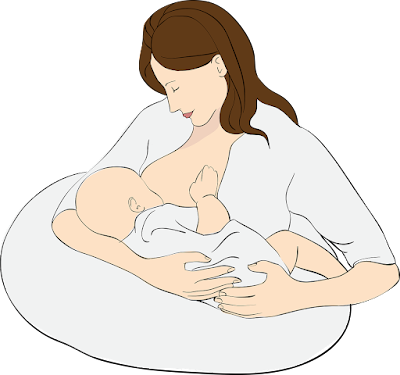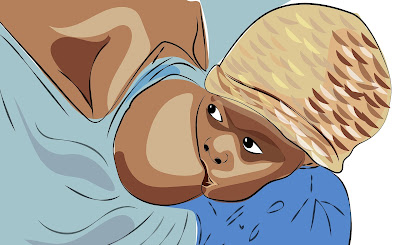Breastfeeding has benefits for mom and baby both!
" Breastfeeding is the best feeding" and there's obviously no matter of doubt in this statement. A woman spends her beautiful journey of pregnancy with a thought of holding her baby in the arms and feeding through her breasts. This is the most beautiful imagination ever!, and the world around her changes significantly when she chooses to breastfeed her baby or babies.
No food formula or milk supplement can take place of breastmilk. Breast milk is a natural body fluid secreted from the breasts under the stimulation and release by oxytocin and prolactin hormones. The breast milk is loaded with nutrients, water and antibodies.
Prolactin is a hormone that helps in the secretion or production of the breastmilk.
Oxytocin is a hormone that helps in the ejection of the milk from the breasts when the baby sucks on the mother's nipple. It is also known as a letdown reflex or a milk ejection reflex.
Amazing Benefits of Breastfeeding:
Top 10 Benefits of breastfeeding for the Mom/mother:
- It helps in recovering from the childbirth.
- It helps in the natural retraction of the uterus.
- It stimulates the production of milk needed for her baby.
- It provides warmth to the baby.
- It helps in reducing the weight gained during pregnancy, this, however depends on your activity levels post-delivery. Not all, but it is said that most women tend to lose their weight when they start nursing their babies.
- It induces lactation amenorrhea, which clearly means no periods or menses for almost 3-6 month(depends, different for all women). This is just like a worry less in the list. A mother can look after the baby nicely in the absence of periods.
- It reduces the risk of ovarian, cervical and breast cancer.
- It helps in normalizing the physiological changes that took place during pregnancy.
- The most important benefit of breastfeeding is the increase in the emotional bond of mom and baby. It also reduces the stress of the nursing mothers.
- It gives a sense of well-being and authority of having been a mother to a baby. This completely assigns her a new identity in her life as a mother.
Top 10 benefits of breastfeeding for the baby:
- It helps in nourishing and providing strength to the baby. Breastmilk is the only ideal and best feeding a baby receives exclusively during the first six months of life. Breastfeeding provides the best nutrition to the baby.
- It helps in the growth and development of the baby. Premature baby when breastfed exclusively gain weight drastically.
- It protects the baby from harmful diseases. The breastmilk contains the antibodies from mother's blood which helps the baby to fight against the diseases.
- It is necessary for effective brain development during the initial moths of life.
- It increases the production of breast milk as the baby is habituated to suck on the nipple more.
- It provides enough hydration to the baby as breast milk contains good amount of water in it. Breastmilk is gentle on baby tummy and is easily digestible causing less problems such as bloating, constipation or diarrhea.
- It provides energy to the baby and helps the baby in becoming active and playful.
- It reduces the risk of asthma, diabetes and other long-term disorders in babies.
- It increases the mother-infant bond and a sense of trust starts to develop in the baby for the mother.
- It reduces the risk of infant diseases and illnesses related to ear, digestive and respiratory system. Well-feeding baby are generally active and healthy. They tend to be more smarter as shown in some researches.




Comments